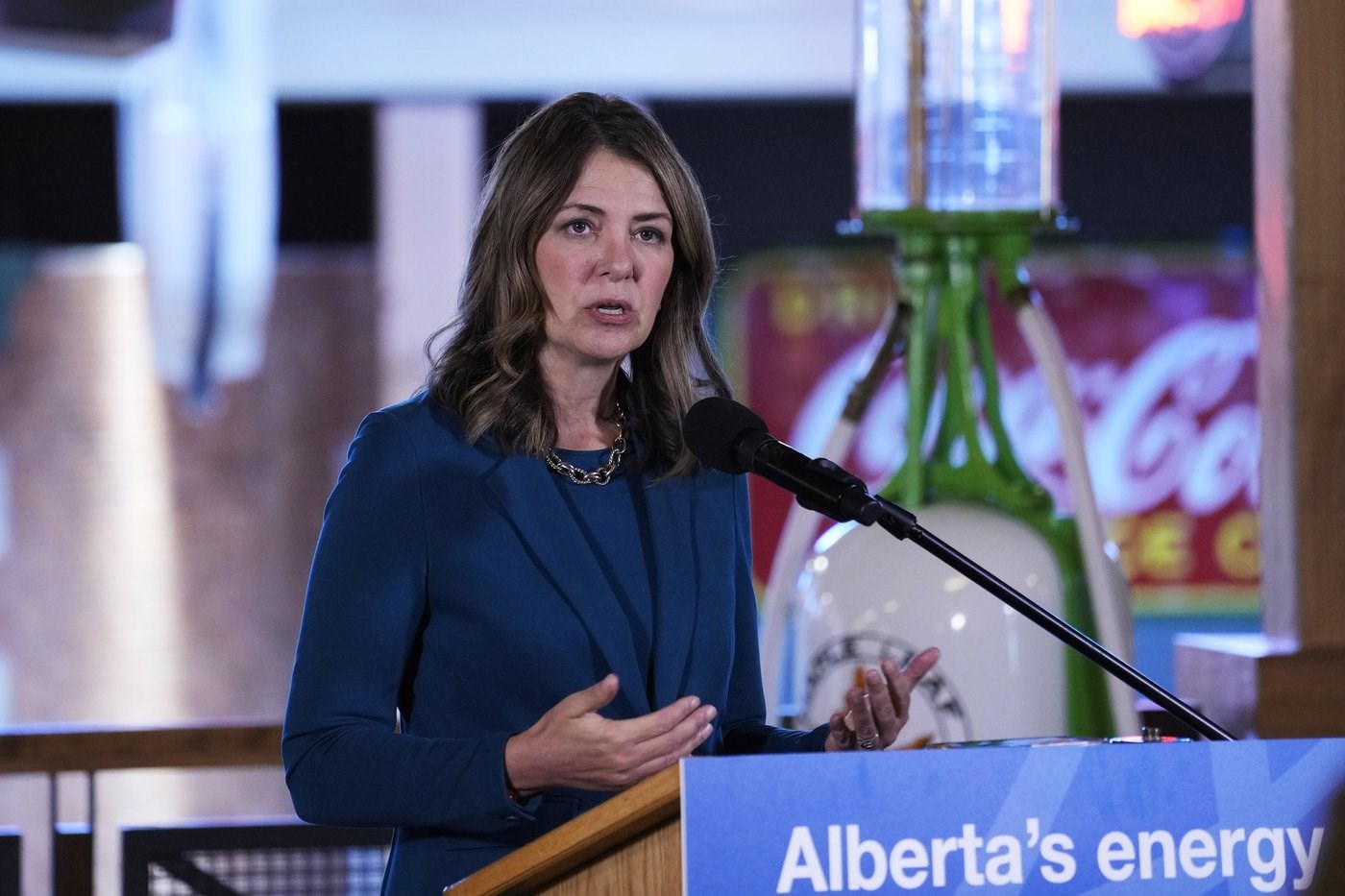
Alberta Premier Danielle Smith announces plans to submit an application for a new oil pipeline to northwestern British Columbia, in Calgary, on Wednesday, Oct. 1, 2025. THE CANADIAN PRESS/Todd Korol
Republished October 07, 2025 - 5:00 PM
Original Publication Date October 07, 2025 - 11:36 AM
VICTORIA — Premier David Eby says a pipeline plan across northern B.C. by Alberta Premier Danielle Smith threatens community support and social licence that would allow other major projects along the provincial coast to move forward.
Smith's proposal for an oil pipeline to B.C.'s north coast would require Ottawa to scrap a tanker ban in the region, and Eby said Tuesday that such a move risks upsetting the current "fragile consensus" over resource development, one that he hopes to strengthen.
If there is to be a conversation, Eby said, it should be about a "real project," not one that hasn't secured a proponent, funding or environmental assessment approval.
When you apply that test, Eby said, Smith's plan "fails on every count."
"The premier of B.C. is not a threat to the pipeline project of the premier of Alberta, because there is no pipeline project," Eby said.
His reaction came after Smith said Eby's recent rejection of her pipeline pitch was "un-Canadian" and "unconstitutional."
She made the remarks after Eby called the proposed pipeline "fictional" in a video posted Monday.
Eby told an unrelated news conference in Victoria that Smith's pipeline proposal could only go ahead with billions of dollars in public money, and provinces other than Alberta should be given a "fair shot" at proposing their own projects for consideration by Ottawa.
"It's not the Danielle Smith show, it's the Canadian team," Eby said, adding "there's nothing more Canadian than fairness."
He said B.C. is advancing more than $40 billion worth of "real projects" with proponents and financing that will employ people from across Canada and help the country reduce its dependence on the United States as a trading partner.
"These projects … will pay royalties that support the federal government program of meeting our NATO commitments," he said.
But Eby said Smith's plan threatens to upend those projects, including upgrades at the Port of Prince Rupert, as coastal First Nations express concern.
When asked whether B.C. would eventually be forced to capitulate if it were the only province opposed to Smith's plan, Eby said he was opposed to "using our coast as a political tool."
"We need, as a country, less politics and more projects," Eby said.
Earlier Tuesday, B.C.'s energy minister said the "definition of being Canadian isn't to agree with everything Danielle Smith says."
Adrian Dix said B.C. will continue to "support real projects" with real proponents and real money behind them, calling Smith's proposed pipeline a "political proposal."
Dix said Canadians should be coming together to work on projects that drive jobs and incomes for families instead of debating about those that lack business plans.
Opposition B.C. Conservative Leader John Rustad agreed with Smith, saying Eby needs to be "called out for blocking the prosperity of Canadians."
Rustad said B.C. residents need to think of themselves "not as British Columbians" but as Canadians, who must help landlocked Alberta and Saskatchewan get their products to market.
The proposed pipeline could help renew Confederation by quelling Alberta's separatist movement, which "has real grievances," he said.
Rustad acknowledged that such a pipeline would require support from First Nations, which he said he would seek.
"We want to do what we can to get agreements in place," Rustad said. "But at the same time, we cannot allow a group or an individual nation to stop the prosperity of Canada, of all the people. British Columbia needs to make decisions on behalf of all British Columbians, not just on one group or another."
Margot Young, a professor at the Allard School of Law at the University of British Columbia, who focuses on the intersection of social justice and constitutional law, called Smith’s use of terms like unconstitutional and un-Canadian “wedge rhetoric” and “kind of meaningless.”
“(Eby’s) comments are not unconstitutional, they're political, and the debate between them is not constitutional, it's political,” she said Tuesday.
Young said the constitutional question raised by a pipeline is “pretty straightforward” because pipelines that travel between two or more provinces fall under federal jurisdiction.
“(Eby) is not doing anything unconstitutional to speak the way he does and say, we don't want this in B.C., nor is it un-Canadian to care about the environment,” she said.
“One would think that in Canada … caring about the environment and about Indigenous consent is precisely what Canadian should be," she said.
Prime Minister Mark Carney said last month that his government expects to announce the second round of major projects of national significance before the Grey Cup on Nov. 15.
Eby said he would "love to see" the North Coast Transmission Line, a proposed 500 kilovolt line from Prince George to Terrace, make the cut because it will enable Indigenous partnership, protect wild spaces and lead to additional investments in mining.
This report by The Canadian Press was first published Oct. 7, 2025.
— With files from Ashley Joannou in Vancouver
News from © The Canadian Press, 2025